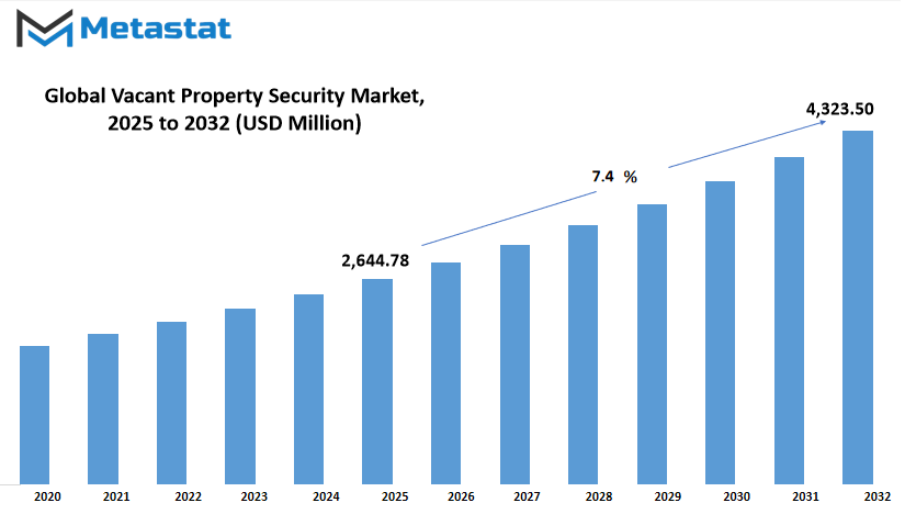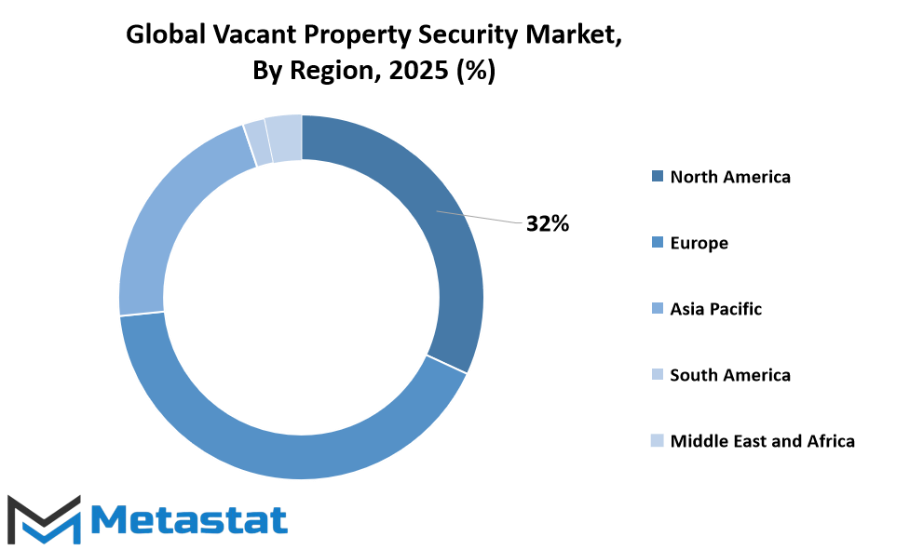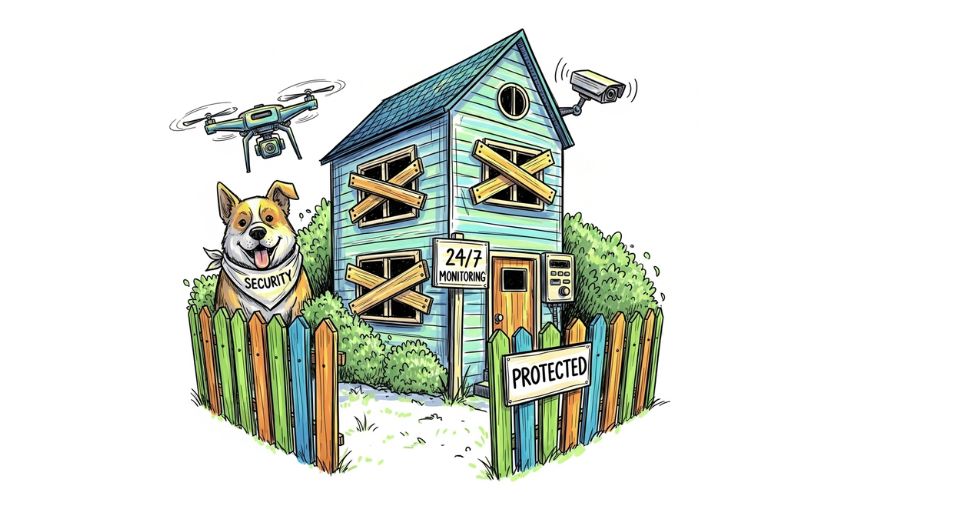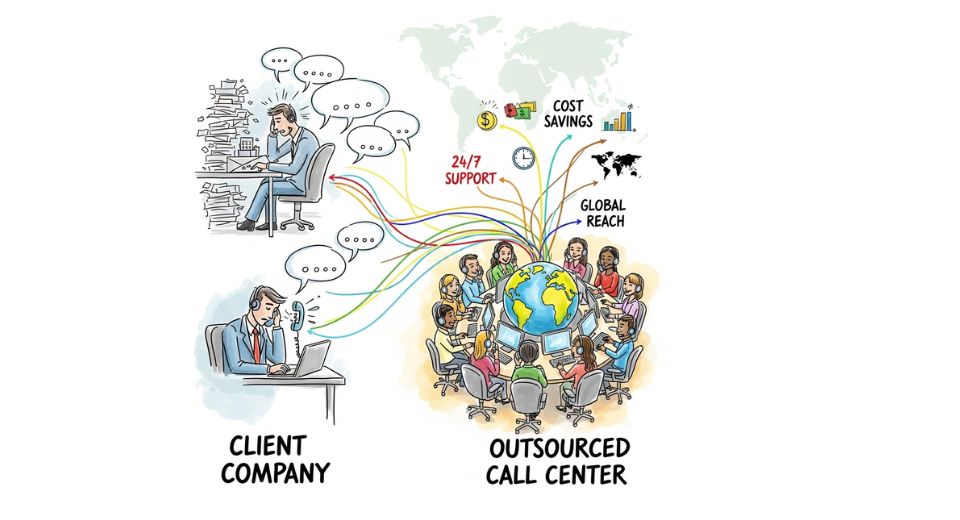MARKET OVERVIEW
The global vacant property security market will be a key component of the safety and maintenance industry. It will entail services, technologies, and practices to secure empty buildings from damage, trespassing, and deterioration. In the future, it will define how owners of property maintain value in buildings left unoccupied for years.
In the immediate future, experts in this sector will use customized alarm systems, remote monitoring devices, and periodic physical checks to maintain vacant properties in secure condition. Those systems will alert them if there is abnormal activity occurring, preventing vandalism or unwanted entry. Owners will use real-time warnings and premeditated reaction plans to maintain properties intact even if there is no one present on the premises.
Organizations will increasingly resort to intelligent sensors that can sense environmental problems such as leaks or sudden temperature changes to guarantee that empty buildings are still livable and that minor issues never become expensive. Information from those sensors will stream into centralized hubs that facilitate timely decisions, avoiding risks such as mold or building damage. Monitoring teams will translate that information and work with local teams to solve issues early, long before substantial loss is incurred.
Most players in this space will provide a blend of physical presence and virtual monitoring that responds to the unique conditions of each building. They will determine what blend of patrols, access controls, and off-site cameras is most suited to each property's configuration, environment, and areas of vulnerability. Personnel will be present on premises while systems operate around the clock, creating a layered protection even when nobody inhabits or occupies the space.
The industry will be able to control numerous properties spread over wide areas from individual control centers. Technicians will be alerted by motion sensors, smashed windows, or attempts to force entry. They will confirm incidents over video links, and then send out response teams accordingly. The industry will, in practice, run twenty-four hours a day, with automation balanced by human intervention.
Furthermore, this line of service will go beyond trespassing prevention. It will involve preparation for bad weather, such as boarding up windows in anticipation of storms or flushing pipes in anticipation of freezing weather. Service providers will notify clients of maintenance concerns like biohazards or rodents in order to prevent degradation over time. They will schedule repairs or cleanup where needed, allowing owners to sidestep insurance claims or regulatory fines.
Regulations throughout most areas will mandate that empty buildings be kept under lock and key to minimize the deterioration of the surrounding area, and companies will comply with those regulations by enforcing consistent standards. Insurers will insist on seeing proof that appropriate measures were taken to safeguard buildings that have been left empty. By doing this, property managers will depend on detailed records and audits to prove they were responsible.
Through the combination of technology, regular inspections, and regulatory compliance, this industry will provide assurance that vacant buildings will be structurally sound and legally compliant. It will enable property owners to ensure safety and retain long-term value. The industry will continue to develop methods, enhancing detection and response, and establishing trust with clients.
Before long, it will be evident that safeguarding vacant properties requires a specialized blend of vigilance, flexibility, and accountability. Over time, this niche will be recognized as a foundation within the larger property preservation and risk abatement sector, and those in the profession will provide lasting value with consistent coverage. Their work will ensure that doing nothing will no longer equate to leaving buildings at risk.
Global vacant property security market is estimated to reach $4,323.50 Million by 2032; growing at a CAGR of 7.4% from 2025 to 2032.

GROWTH FACTORS
The global vacant property security market is gaining attention as cities expand and more buildings remain unoccupied for different periods of time. Many property owners are becoming more aware of the risks that come with leaving homes, offices, or industrial sites unattended. One of the key factors driving the growth of this market is the rising crime rate in unoccupied properties. Empty spaces often attract theft, vandalism, and even illegal occupation, making reliable security solutions not just an option but a necessity. Property owners are increasingly investing in advanced tools to safeguard their assets, knowing that the financial and emotional cost of damage or loss can be significant.
Insurance companies are also shaping the direction of this market. Many now require owners of vacant properties to have proper security systems in place before issuing or renewing policies. This push from insurers is encouraging wider adoption of these solutions, especially among commercial property owners who cannot afford delays or disputes in claims processing. As a result, there is a clear link between insurance requirements and the rising demand for better and more dependable vacant property security services.
However, there are hurdles that could slow down the pace of market growth. One major challenge is the high cost of advanced monitoring and surveillance systems. While large property management firms can often cover these expenses, small property owners may find the investment difficult to manage. Limited awareness also plays a part, as many individuals or small businesses are still unfamiliar with the benefits of adopting modern security systems, leaving many properties at risk.
Looking ahead, the integration of AI-powered surveillance and remote monitoring brings exciting potential for the global vacant property security market. With AI, security systems will be able to detect unusual activity faster and with more accuracy, reducing false alarms and improving response times. Remote monitoring will also allow owners to manage and observe their properties from any location, offering a sense of control and peace of mind that traditional systems cannot match.
These technological improvements are expected to drive stronger adoption in the coming years. As costs gradually decline and awareness grows, even small property owners will find these solutions more accessible. The market will continue to evolve with better tools and smarter systems, providing not just protection but also data-driven insights to help prevent incidents before they happen. With security becoming a key concern in urban and suburban areas, the global vacant property security market will see steady and meaningful growth in the near future.
MARKET SEGMENTATION
By Service Type
The future will bring a shift in how we keep empty buildings safe. As more properties sit unused whether homes, offices, or shops the global vacant property security market will grow in importance. This market will focus on keeping these places protected from theft, vandalism, or damage. It will grow not just because more spaces are left empty, but also because new tools are becoming smarter and easier to use.
By service type, the global vacant property security market will break down into different options like steel security screens and doors, smart locks, smart alarms, manned guarding, mobile patrols, and remote monitoring. Steel screens and doors will still offer strong physical protection and will keep out intruders when power or connectivity fails. They are simple and reliable.
Smart locks will let managers allow or deny access remotely. Anyone with the right code or app will enter, and access logs will record who came and when. Smart alarms will send warnings to phones or security centers when something goes wrong. These alarms may include sensors for movement, glass breakage, or flooding.
Manned guarding will add a human presence. Having people on site may seem old-fashioned, but it will still matter when human judgment is needed. Mobile patrols will cover more ground; officers will drive by or stop in when needed, giving a mix of physical presence and efficiency.
Remote monitoring will tie everything together. Cameras, sensors, and smart locks will send live information to security centers. Staff will watch feeds and act fast if they see something wrong. This kind of setup will use the best of digital tools and human oversight.
When we think ahead, the global vacant property security market will become more connected. Smart locks and alarms will link up with remote monitoring. Mobile patrols will coordinate with digital alerts. Steel doors will support smart systems by acting as a sturdy backup. That mix will offer better coverage, faster response, and more peace of mind, especially as remote work and flexible property use change how often places sit empty.
In that way, protecting empty buildings will not just rely on one method. It will blend strong physical elements, smart gadgets, and human attention. That combination will be the future of keeping unused properties safe.
By Duration
In the short term, solutions must be quick and smart. Drones, sensors that turn on in empty rooms, and mobile patrol services will all be part of how we keep watch over a property just vacated or waiting for change. These are tools that can be rented or activated only when needed, offering immediate coverage. They will solve urgent concerns like preventing vandalism or spotting unauthorized access. Over time, these quick options will shift from being backups to becoming common in response plans. In that early stage, flexibility and speed will matter most.
When we think ahead to the long term, our focus shifts. Buildings that remain empty for years will need systems built in, possibly during construction or right after vacancy. Smart locks programmed with remote access, networks of alarms that connect to local services instantly, and predictive software to guess when risks will rise all of that will become standard. Inventions we only imagine today, like windows that sense changes in vibration or walls that send an alert when pressure is applied, will become routine parts of how we protect buildings. For properties left empty while waiting for redevelopment, these systems will shape security planning from the ground up.
It’s exciting to picture how the global vacant property security market will adapt to future challenges. As more buildings lie idle between uses, the industry will learn to balance quick-response tools that work now with built-in defenses that last. It will push toward security systems that learn, adjust, and prevent problems before they start. In a future where space changes shape rapidly, having both rental tools ready today and smart gear ready for tomorrow will keep vacant places safe and ready for whatever comes next.
By Application
The global vacant property security market will continue to play an essential role in protecting unoccupied buildings as urban development and property investments expand worldwide. With the rise in real estate projects and frequent changes in property ownership, the demand for advanced and reliable security solutions is increasing steadily. Property owners, developers, and managers understand that an unoccupied space is often vulnerable to risks such as vandalism, theft, illegal occupation, or structural damage. This growing awareness will keep driving innovations in security systems that are both efficient and cost-effective.
By application, the market is further divided into residential and commercial properties. Residential properties will see strong growth as more people invest in homes, vacation houses, and rental properties that may remain empty for long periods. Owners want to ensure that their properties are safe and ready for future use or sale without the worry of damage or loss. On the other hand, commercial spaces such as office buildings, retail outlets, and warehouses are increasingly investing in smart surveillance and remote monitoring systems. These advanced solutions will allow property managers to maintain control over sites even from distant locations, ensuring safety around the clock.
Technology will continue to shape the direction of the global vacant property security market. The integration of artificial intelligence, cloud-based systems, and real-time data monitoring will make security more accurate and responsive. For example, systems that analyze movement patterns and alert owners instantly will reduce response time to threats. Additionally, the use of eco-friendly and low-maintenance devices will become more common, offering both sustainability and convenience to users.
Looking ahead, the global vacant property security market will likely see a shift toward more personalized and adaptable services. Security providers will focus on solutions that can be customized to fit the unique needs of different property types. Residential customers might prefer automated locking systems and motion sensors, while commercial clients may prioritize high-definition video surveillance and advanced access control features. As urban spaces grow and digital technology improves, the market will keep evolving to deliver smarter, more reliable, and more affordable security measures.
This market’s growth will also be influenced by regulatory standards that emphasize safety and risk prevention. As cities and governments enforce stricter safety guidelines, property owners will continue to invest in trusted security solutions. With innovation driving better protection and efficiency, the global vacant property security market will remain a vital part of the real estate industry, ensuring that vacant properties are safe, monitored, and well-maintained for the future.
By Client Type
The future of the global vacant property security market looks thoughtful and promising. As empty buildings, homes, or other structures stand idle, the need to protect them grows. Security will play a vital role not just today, but especially as cities and populations change in the years ahead. By looking ahead, we can see how different users like individual property owners and government agencies will shape what solutions matter most.
Individual property owners will have a strong voice in this story. They might want smart systems that are easy to use and affordable. These systems will include sensors that detect movement or help spot damage early. Owners could use apps on their phones to check a property at any moment, bringing them peace of mind even when they are far away. Owners will also appreciate tools that warn them about potential threats before they become real problems. In time, these tools will work on solar power or long-life batteries, lowering maintenance needs. It won’t just be about alarms, but about making systems that work quietly, reliably, and on their own.
Government agencies will also shape the path ahead. Cities or regions managing many vacant properties perhaps due to economic shifts or demographic changes will want scalable and efficient approaches. They will focus on networks of sensors and cameras that connect through secure, shared platforms. These platforms will let teams monitor many locations from one hub. With data analytics, they will spot trends such as repeat vandalism or patterns in break-ins. Agencies will also choose options that help them budget wisely and respond quickly when something happens. They will look for partnerships with private firms that can deliver and manage platforms with speed and skill.
Looking ahead, cooperation between owners and government bodies will be important. Innovations in drone surveillance or AI-based alerts may become standard, though owners may choose basic systems while agencies may handle advanced tech. A shared future will encourage tools that grow in functionality as needs change and budgets shift. Whether someone owns one empty home or manages hundreds, the focus will stay on building solutions that keep spaces safe, smart, and suited to real-world use.
In that future, the global vacant property security market will be defined by clarity, usability, and forward-looking design tailored to both individuals and public organizations. Simple, dependable tools and systems will shape how vacant properties stay protected in the years ahead.
|
Forecast Period |
2025-2032 |
|
Market Size in 2025 |
$2,644.78 million |
|
Market Size by 2032 |
$4,323.50 Million |
|
Growth Rate from 2025 to 2032 |
7.4% |
|
Base Year |
2024 |
|
Regions Covered |
North America, Europe, Asia-Pacific Green, South America, Middle East & Africa |
REGIONAL ANALYSIS
The global vacant property security market is steadily gaining attention as urban areas expand and real estate investments grow worldwide. As more properties are left unoccupied for longer periods, the demand for efficient security solutions will continue to rise. This market is influenced by the need for innovative systems that protect vacant buildings, land, and commercial sites from theft, vandalism, and unauthorized entry. With technology advancing quickly, the future will likely see a stronger push toward integrated solutions that combine surveillance, artificial intelligence, and remote monitoring.
Geographically, the global vacant property security market is spread across North America, Europe, Asia-Pacific, South America, and the Middle East & Africa, with each region showing unique patterns of growth. North America, driven by the U.S., Canada, and Mexico, will continue to benefit from advanced technologies and a growing emphasis on smart security systems. The region is expected to lead in adopting automated monitoring tools that enhance efficiency and reduce costs for property owners. In Europe, countries like the UK, Germany, France, and Italy will focus on sustainable and eco-friendly security options, reflecting their commitment to green building standards and energy-efficient solutions.
In the Asia-Pacific region, which includes India, China, Japan, South Korea, and the Rest of Asia-Pacific, rapid urban development and population growth will push demand higher. Rising investments in commercial properties, combined with the fast adoption of digital security platforms, will play a major role in shaping future trends in this area. South America, led by Brazil and Argentina, will see a steady rise in demand, supported by new property developments and the need to secure unoccupied sites in urban and industrial locations.
The Middle East & Africa, including the GCC Countries, Egypt, South Africa, and other parts of the region, will likely show increasing growth due to expanding construction projects and government investments in infrastructure. This region will lean toward adopting advanced systems that can handle large-scale property monitoring while ensuring real-time alerts and quick response capabilities.
Looking ahead, the global vacant property security market will grow alongside technological improvements. The integration of smart cameras, motion sensors, and cloud-based control systems will help improve security efficiency and make management easier for owners and operators. As cities continue to modernize and property investments rise, the focus will shift toward scalable and automated security solutions that can adapt to various types of properties across different regions. This ongoing progress will shape a market that is more connected, responsive, and prepared to handle the challenges of keeping vacant properties safe worldwide.

COMPETITIVE PLAYERS
The global vacant property security market will take shape around a future where vacant properties receive smart attention. Companies in this field will move beyond routine patrols. VPS Group will bring sensor networks that detect even subtle movement. Prosegur will focus on predictive algorithms that learn patterns, allowing quick responses to anomalies. Securitas Direct will offer intuitive interfaces, combining user-friendly dashboards with immediate alerts that keep managers informed at every step. Tiekom will provide real-time video analytics tailored to remote use, letting property owners monitor with clarity. Best Alarm System will bring modular tools that adapt to different building types, so options will fit homes, offices, or industrial sites alike. Barcelonica will introduce solar-powered units, minimizing energy needs and simplifying setup.
EULEN Group will develop integration systems that link security with building management, creating seamless oversight. SICOR Group will offer AI-assisted patrol scheduling, cutting response times. Securitas Seguridad España will invest in scalable platforms, so tools will grow as property portfolios grow. Trablisa, s.a. will focus on mobile-ready platforms, ensuring that alerts and updates reach teams on the move. Pro-Vigil will specialize in remote site assessments powered by drones and robots, cutting reliance on human presence. Clearway Group Holdings Limited will develop off-grid security pods that stand alone in remote settings. Live-in Guardians Ltd. will refine models where live guardians stay on site, offering both deterrence and rapid human response. Lowe Management Ltd. will introduce predictive maintenance for security hardware, so equipment will stay current and reliable.
A future gaze at the global vacant property security market shows a shift toward smarter, more adaptive, and more resilient forms of protection. Control systems and surveillance will converge. Automation will reduce unnecessary alerts. Alerts will reach property managers instantly, and resources will allocate in real time. Security providers will offer more than locks or cameras. Each company will deliver a unique edge be it mobile alerts, solar independence, drone patrols, or live human presence so choices will match needs precisely. That will define competition in this sphere. Overall, the global vacant property security market will evolve into a network of responsive, efficient, and scalable solutions.
Vacant Property Security Market Key Segments:
By Service Type
- Steel Security Screens/Doors
- Smart Lock
- Smart Alarm
- Manned Guarding
- Mobile Patrols
- Remote Monitoring
By Duration
- Short Term
- Long Term
By Application
- Residential
- Commercial
By Client Type
- Individual Property Owners
- Government Agencies
Key Global Vacant Property Security Industry Players
- VPS Group
- Prosegur
- Securitas Direct
- Tiekom
- Best Alarm System
- Barcelonica
- EULEN Group
- SICOR Group
- Securitas Seguridad España
- Trablisa, s.a.
- Pro-Vigil
- Clearway Group Holdings Limited
- Live-in Guardians Ltd.
- Lowe Management Ltd.
WHAT REPORT PROVIDES
- Full in-depth analysis of the parent Industry
- Important changes in market and its dynamics
- Segmentation details of the market
- Former, on-going, and projected market analysis in terms of volume and value
- Assessment of niche industry developments
- Market share analysis
- Key strategies of major players
- Emerging segments and regional growth potential








 US: +1 3023308252
US: +1 3023308252






